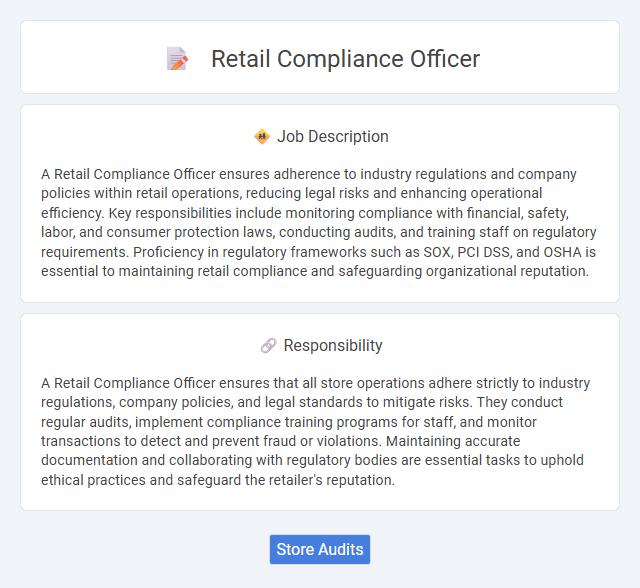
A Retail Compliance Officer ensures adherence to industry regulations and company policies within retail operations, reducing legal risks and enhancing operational efficiency. Key responsibilities include monitoring compliance with financial, safety, labor, and consumer protection laws, conducting audits, and training staff on regulatory requirements. Proficiency in regulatory frameworks such as SOX, PCI DSS, and OSHA is essential to maintaining retail compliance and safeguarding organizational reputation.
Individuals with strong attention to detail and a commitment to ethical standards are likely to be suitable for a Retail Compliance Officer role. People who can handle pressure and maintain impartiality when enforcing regulations probably fit well in this position. However, those who struggle with strict policy adherence or frequent regulatory updates might find the role challenging.
Qualification
A Retail Compliance Officer must possess a deep understanding of regulatory requirements specific to the retail industry, including knowledge of consumer protection laws, data privacy regulations, and anti-money laundering standards. Essential qualifications include a bachelor's degree in business administration, law, or finance, accompanied by professional certifications such as Certified Compliance and Ethics Professional (CCEP) or Certified Regulatory Compliance Manager (CRCM). Proficiency in risk assessment, internal auditing, and policy implementation skills are critical for ensuring full compliance across retail operations.
Responsibility
A Retail Compliance Officer ensures that all store operations adhere strictly to industry regulations, company policies, and legal standards to mitigate risks. They conduct regular audits, implement compliance training programs for staff, and monitor transactions to detect and prevent fraud or violations. Maintaining accurate documentation and collaborating with regulatory bodies are essential tasks to uphold ethical practices and safeguard the retailer's reputation.
Benefit
A Retail Compliance Officer is likely to enhance operational efficiency by ensuring adherence to regulatory standards and company policies, reducing the risk of legal issues and financial penalties. This role may improve customer trust and brand reputation through consistent enforcement of ethical practices. It probably offers career growth opportunities in risk management and regulatory affairs within the retail sector.
Challenge
Retail Compliance Officers likely face the challenge of navigating complex regulatory requirements that frequently change, making it essential to stay updated and adapt swiftly. Ensuring all retail operations comply with legal standards probably demands meticulous attention to detail and strong analytical skills to identify potential risks. Balancing strict compliance enforcement with maintaining positive employee and customer relations may also present ongoing difficulties in this role.
Career Advancement
Retail Compliance Officers play a crucial role in ensuring that store operations adhere to legal standards and company policies, which directly impacts regulatory risk management and operational efficiency. Mastery of regulatory frameworks such as SOX, HIPAA, and PCI DSS can lead to opportunities for advancement into senior compliance roles or corporate governance positions. Developing expertise in risk assessment, audit coordination, and compliance training enhances prospects for career growth within retail chains or transitioning to compliance leadership roles in other industries.
Key Terms
Store Audits
Retail Compliance Officers conduct thorough store audits to ensure adherence to company policies, legal regulations, and safety standards. These audits involve evaluating merchandising practices, transaction accuracy, and inventory control to identify discrepancies and mitigate risks. Effective store audits enhance operational efficiency, reduce loss, and maintain regulatory compliance across retail locations.
 kuljobs.com
kuljobs.com